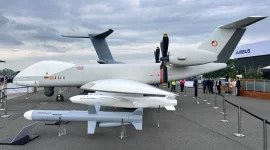- Views: 3K
- Replies: 5
Concerns have been raised over the Chinese ownership links of the engine powering India's Archer-NG Medium Altitude Long Endurance (MALE) Unmanned Aerial Vehicle (UAV).
Defence analyst Angad Singh has highlighted the potential security risks associated with the Austro 330EP engine, which is manufactured by Austro Engine, a subsidiary of Diamond Aircraft Industries, acquired by China's Wanfeng Aviation Industry in 2017.
This revelation raises questions about the long-term viability of using a foreign-owned engine, especially one with ties to China, in a sensitive indigenous defence platform like the Archer-NG. However, Singh suggests this engine may only be a temporary solution for the UAV's early development stages.
However, to address these concerns and bolster self-reliance, the Defence Research and Development Organisation (DRDO) has proactively developed an indigenous engine in collaboration with the Vehicles Research and Development Establishment (VRDE) and Jayem Automotives. This new engine, boasting 180 horsepower, is specifically designed to meet India's operational needs, including consistent power delivery up to 11,000 feet – crucial for operations in mountainous terrain
The indigenous engine boasts several advantages over the Austro 330EP. It features an indigenously developed Full Authority Digital Engine Control (FADEC) system, which has undergone extensive testing to ensure optimal performance and safety. The FADEC system provides precise control over the engine's power output, crucial for UAV stability and efficiency across various mission profiles.
Beyond FADEC, the engine has been rigorously tested in demanding conditions, validating its power output, thrust generation, and fuel consumption. High-altitude trials, including tests in Leh and Changla at elevations up to 17,664 feet, have demonstrated its suitability for operations in India's challenging northern and mountainous regions.
Crucially, the indigenous engine has proven its reliability in high-altitude performance tests, completing over 1,100 hours of testing under stringent conditions. These tests, which included evaluations of power, thrust, and fuel efficiency, provide valuable data on the engine's durability and suitability for prolonged UAV operations.
The engine has also successfully completed taxi trials with the Tapas platform, paving the way for its integration into the Archer-NG. These trials validate the engine's compatibility and reliability with the UAV's design and mission requirements, bringing the Archer-NG closer to a fully indigenous configuration.
Singh's concerns underscore the potential risks associated with relying on foreign-sourced components in strategic defence programs. China's ownership of Austro Engine raises concerns about potential cybersecurity vulnerabilities and supply chain disruptions, particularly given the Archer-NG's intended role in Intelligence, Surveillance, Target Acquisition, Reconnaissance (ISTAR) missions, and strike operations.
The indigenous engine developed by DRDO's VRDE and Jayem Automotives offers a compelling solution to these challenges. As the Archer-NG program progresses, integrating this homegrown engine will reduce India's dependency on foreign suppliers, advance its strategic self-reliance goals, and mitigate the risks associated with sourcing critical components from countries like China.



